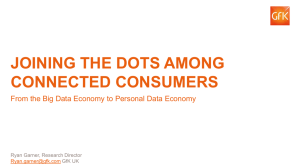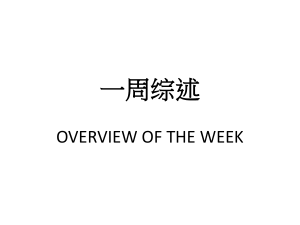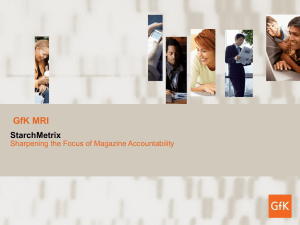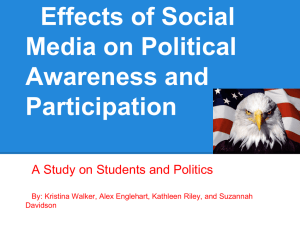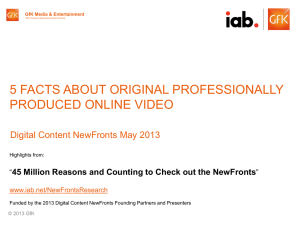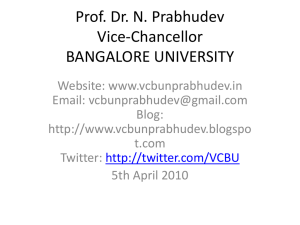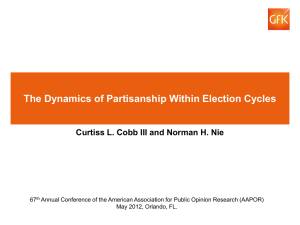Q1 2012 Conference Call
advertisement
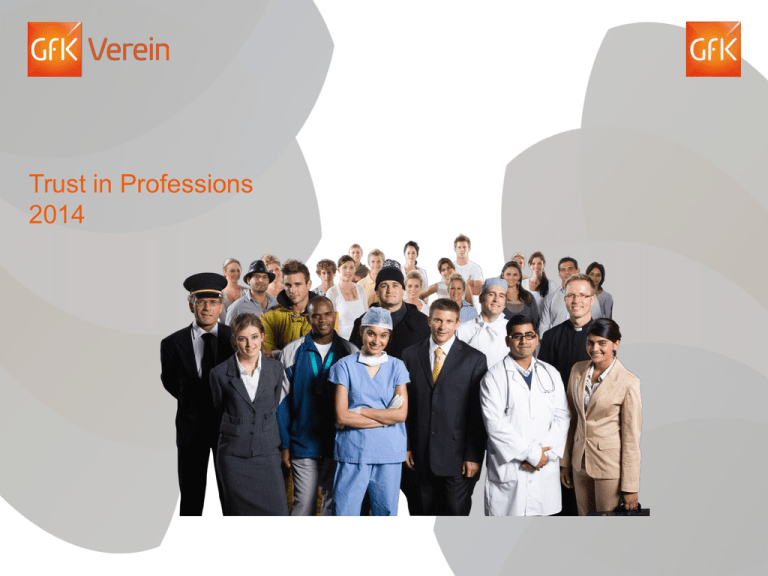
Trust in Professions 2014 © GfK 2014 | GfK SE Source: GfK Verein, Trust in Professions 2014 1 Introduction If you can trust someone, you don‘t need a contract. If you can‘t trust him, a contract is useless (J.P. Getty) In societies resting on the division of labour, also actors and TV hosts. Men on the other hand tend to professions are functionally of central importance: outside trust more strongly in technical professions such as their private sphere of life, citizens and consumers come engineers, computer specialists and architects but also primarily into contact with representatives of professional professional athletes. groups, such as doctors, craftsmen, policemen or traders. Reciprocated trust is important to these relationships. This global study encompasses the empirically researched trust in over 30 professions with which people, directly or indirectly (i.e. medially communicated), can or must enter into relationships in their daily lives. In doing so, the selection process concentrated on professions that are actually present in all 25 of the countries examined. The global trust ranking is led by undisputed In addition, this report contains the results of an online analysis for five selected professions in Germany and Great Britain: in Germany, policemen are subjected to the most statements or comments, market and opinion researchers the least and bankers are discussed in a negative context by far the most often on the Internet. Ronald Frank GfK Verein professions, which are essential for the basic functioning of economy and society and which must be able to be relied on especially in emergencies and other exceptional circumstances: fire fighters, paramedics, technicians and doctors, but also pilots and craftsmen. Professions such as bank assistants, traders or retailers, journalists as well as civil servants and policemen are in the trust midfield, but present themselves as very controversial in the assessment in a wide range (min. 20% and max. 80%) between individual countries. Are women more trusting than men? For Germany and a number of other European countries, it appears that women have more trust in a whole host of professions: these include priests, mayors and civil servants as well as market and opinion researchers and bank assistants but © GfK 2014 | GfK SE Source: GfK Verein, Trust in Professions 2014 2 Global Trust Around 28,000 interviews were carried out in 25 selected countries in Europe, North and South America, in the Asia/Pacific region and in Africa. Taking age restrictions into account, those questioned represent a good 2.2 billion people worldwide. The trust of the population was ascertained in 32 different professional groups. In a comparison of top professional groups in the 25 mark, 10 of the 32 professional groups engender a very countries, i.e. the professional groups that are trusted the high level of trust. Mayors, insurance salesmen and most, fire fighters are the favourites. In 15 of the 25 politicians meet with the least amount of trust across all countries considered, they are at the top of the list. In each countries. of three countries, the rankings are led by nurses or doctors, respectively. In one country in each case, the most At the same time, trust levels inside the 25 countries trustworthy professional groups are the paramedics, varies strongly. The professional group of bank assistants pharmacists, farmers and teachers, the latter together with features the greatest spread of more than 70 percentage the doctors. Amongst the professional groups that meet points: at 14%, trust in Spain is at its weakest and in India with the lowest level of trust, the picture is more at 88% at its strongest. Trust in architects on the other hand homogenous: with the exception of only two countries, the proves to be the most consistent: here, the distance lowest level of trust is engendered by politicians. In between the highest and lowest trust ratings is only 26 Sweden, traders are met with the greatest scepticism, in percentage points (90% in Canada versus 64% in South Indonesia the insurance salesmen – however, in both Korea). countries, the politicians are in the second-lowest position. Calculation of an “average” level of trust across all professional groups for each country shows that in South Africa, India und Canada cross-professional trust is at its greatest. Japan, Brazil and Argentina are at the lower end of the rank order with the least trust. Besides the average level of trust in each country, the trust was calculated in individual professional groups across all countries. To this end, the country results were weighted in accordance with the respective number of inhabitants. The fire fighters are in the lead here, closely followed by the nurses and doctors. All the same, with ratings over the 80% © GfK 2014 | GfK SE Source: GfK Verein, Trust in Professions 2014 3 Trust in professions at a glance (Average of „I completely/generally trust“ across all professional groups, in %) 81 78 77 75 73 72 72 71 70 68 67 Netherlands 67 67 France all countries Austria Sweden 60 59 57 56 55 Italy South Korea Japan Brazil Argentina Ø South Africa India Canada Indonesia USA Turkey Belgium Switzerland 65 65 65 64 64 63 63 62 UK Poland Australia Base: 28,659 respondents © GfK 2014 | GfK SE Germany Kenya Russia Spain Nigeria Source: GfK Verein, Trust in Professions 2014 4 Professions with the highest trust rating per country BELGIUM UK Fire fighters 98% SWEDEN NETHERLANDS Fire fighters 96% Paramedics 98% Fire fighters 96% POLAND Fire fighters 94% RUSSIA Fire fighters 87% FRANCE Fire fighters 99% AUSTRIA CANADA Fire fighters 94% Fire fighters 98% USA SPAIN Fire fighters 97% SOUTH KOREA Nurses 87% TURKEY Pharmacists 90% Fire fighters 97% JAPAN SWITZERLAND Nurses 90% Fire fighters 96% INDIA Soldiers 98% BRAZIL GERMANY Fire fighters 92% Fire fighters 97% KENYA INDONESIA Doctors 87% Doctors/Teacher 93% ITALY ARGENTINA Fire fighters 92% Fire fighters 86% NIGERIA Farmers 84% AUSTRALIA SOUTH AFRICA Doctors 95% Nurses 96% Base: 28,659 respondents © GfK 2014 | GfK SE Source: GfK Verein, Trust in Professions 2014 5 Professions with the lowest trust rating per country BELGIUM UK Politicians 25% SWEDEN NETHERLANDS Politicians 29% Retailer 17% Politicians 17% POLAND Politicians 16% RUSSIA Politicians 30% FRANCE Politicians 13% AUSTRIA CANADA Politicians 20% Politicians 23% USA SPAIN Politicians 23% SOUTH KOREA Politicians 21% TURKEY Politicians 34% Politicians 5% JAPAN SWITZERLAND Politicians 14% Politicians 21% INDIA Politicians 43% BRAZIL GERMANY Politicians 6% Politicians 15% KENYA INDONESIA Politicians 16% Insurance agents 49% ITALY ARGENTINA Politicians 15% Politicians 12% N IGERIA Politicians 29% AUSTRALIA SOUTH AFRICA Politicians 43% Politicians 14% Base: 28,659 respondents © GfK 2014 | GfK SE Source: GfK Verein, Trust in Professions 2014 6 Trust in professional groups: Average across all countries (Average of „I completely/generally trust“ across all countries, in %) Fire fighters 90 Retailer, Seller 67 Nurses 89 Civil servants 67 Doctors, physicians 89 TV-hosts, TV-moderators 66 Teachers 88 Pharmacists 87 Pastors, priests Market- or opinion researchers Farmers 86 Soldiers 85 Paramedics 84 Engineers, Technicians 84 83 Pilots 78 Architects Craftsmen Train-bus-underground- or tram drivers Computer-, Software specialists Judges Bankers, bank assistants 77 76 75 71 69 64 64 64 Journalists 63 Cab drivers Professional athletes, footballer 63 61 Actors 61 Businessmen, entrepreneurs 61 Lawyers 59 Police men 56 Advertising specialists 53 Mayors Insurance agents 48 31 Politicians Base: 28,659 respondents © GfK 2014 | GfK SE Source: GfK Verein, Trust in Professions 2014 7 Netherlands - Findings In the Netherlands, with an average trust rating of not come as much of a surprise. Equally low levels of trust 70% across all professional groups, the population presents are engendered by advertising specialists (44%) and the itself above average compared internationally to other financial sector: bankers are trusted by only 36% and countries. There is a good reason for this: with a CPI of 84 insurance agents by 32% of Dutch citizens. points, the Netherlands boasts a hardly perceptible level of corruption – even if that is certainly not the sole deciding 16.8 M factor for reciprocal trust. Population Politicians form the tail light in the Dutch trust ranking, despite a “good” rating of 29% compared with other countries. The country‘s economic situation, which is in the The pole position is occupied by the fire fighters here 11.2 M too, with 96%. They are followed with gaps of only one Working population (Age 15 to 64) third recession in four years, due to the Euro crisis and weakening exports, might well play a major role here. percentage point in each case by paramedics and nurses. The health professions are generally situated high in the 89.1% ranking, as only teachers (89%) and pilots (92%) are ranked higher than the pharmacists and doctors, who Of age 20-64 secondary-educated CPI 84 Hardly any perceived corruption account for 88% each. /- Policemen are also relatively well positioned in the Netherlands; 82% trust them. The fact that the art thieves of Rotterdam, who were responsible for the spectacular theft -1.0% GDP growth rate 48,250 $ GNI per Capita 4.4% and destruction of paintings worth several million Euro, were caught very quickly could have contributed to this. In addition, the Politie has a very citizen-orientated attitude. Only five professional groups are trusted by less than half of the Dutch: Thus the clergy with 45% are met more with caution, which, in view of the proportion of those without a religious affiliation in the population (42%) does Unemployment rate (ILO) © GfK 2014 | GfK SE Source: GfK Verein, Trust in Professions 2014 8 Trust in professional groups in Netherlands („I completely/generally trust“, in %) Fire fighters 96 Retailer, Seller Paramedics 95 Actors 94 Nurses 92 Pilots 66 TV-hosts, TV-moderators 65 64 89 Civil servants Pharmacists 88 Craftsmen 88 Doctors, physicians Train-bus-underground- or tram drivers 88 Cab drivers Market- or opinion researchers Professional athletes, footballer Farmers 87 Engineers, Technicians 85 Architects 85 82 Police men 79 Judges Soldiers Computer-, Software specialists 78 73 68 Mayors Teachers 88 72 61 57 57 55 Journalists 54 Lawyers 54 Businessmen, entrepreneurs 45 Pastors, priests 44 Advertising specialists 36 Bankers, bank assistants Insurance agents Politicians 32 29 Base: 1,001 respondents © GfK 2014 | GfK SE Source: GfK Verein, Trust in Professions 2014 9 Background information Europe Share of pop. at least Average per secondarycapita income educated (2012) (20-64 years) Total population Expected population growth p.a. Austria 8.5M 67.7% 14K 48,160 $ 97.8% 69 4.1 0.8 Belgium 11.1M 657% 31K 44,990 $ 87.7% 75 7.1 -0.3 France 65.7M 64.9% 325K 41,750 $ 91.1% 71 9.3 0.0 Germany 81.9M 66.1% -166K 44,010 $ 97.0% 79 5.9 0.7 Italy 60.9M 65.5% 138K 33,840 $ 87.6% 42 8.4 -2.4 Netherlands 16.8M 67.0% 47K 48,250 $ 89.1% 84 4.4 -1.0 Poland 38.5M 71.6% 16K 12,670 $ 87.3% 58 9.6 1.9 Russia 143.5M 72.1% -146K 12,700 $ 98.0% 28 6.6 3.4 Spain 46.2M 68.0% 291K 30,110 $ 76.7% 65 21.6 -1.4 Sweden 9.5M 65.3% 54K 56,210 $ 95.5% 88 7.5 0.7 Switzerland 8.0M 68.1% 30K 82,730 $ 95.5% 86 4.1 1.0 Turkey 74.0M 67.6% 850K 10,830 $ 420% 49 9.8 2.2 UK 63.2M 66.0% 380K 38,250 $ 80.1% 74 7.8 0.3 Europe Source © GfK 2014 | GfK SE World Bank, Stand 09/2013 United Nations, Country Profiles, Stand 09/2011 United Nations, Country Profiles, Stand 09/2011 World Bank, GNI per Capita, Atlas Method (current US$) IIASA Education Projection 2010 Corruption Perception Index CPI (2012) Gross domestic product GDP (real) in % Unemployment rate (2011) (2012) Share of working population (15-64 years) Transparency International World Bank, Unemployment Rate, ILO definition World Bank, GDP growth, Stand 09/2013 Source: GfK Verein, Trust in Professions 2014 10 Methodology in general Comment Explanation Query in general For all queried professional groups the following scale was applied: 1) I completely trust them 2) I generally trust them 3) I do not trust them much 4) I do not trust them at all 9) No comment Presentation in general For a better comparability only „I completely/generally trust“ has been displayed graphically Additional question in Germany For the queried trust into people in general, the following answer categories had been used: 1) In the first place, I generally trust everybody 2) Everybody who doesn’t give me a reason not to trust them 3) Only people I have had positive experiences with 4) In the first place, I generally don’t trust anybody 9) No comment © GfK 2014 | GfK SE Source: GfK Verein, Trust in Professions 2014 11
